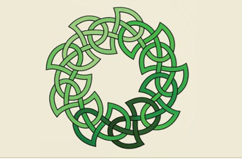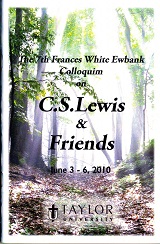Event Title
Academic Paper Session IV-C
Location
Rupp 205
Start Date
5-6-2010 3:00 PM
Description
"C.S. Lewis, His View of Heaven and His Theodicy: Living Now as Citizens of Heaven" - Christine Goslin
"The Role of Mathematics in the Apologetic Works of C.S Lewis" - Matt D. Lunsford
Clive Staples Lewis (1898-1963) was one of the intellectual giants of the 20th century and arguably the most influential Christian author of that period. In spite of his own personal lack of success in the area of mathematics, C.S. Lewis exhibited a lofty appreciation of the discipline as demonstrated by numerous references to mathematics and to mathematical objects, and by his recurrent use of mathematical terminology in his apologetic writings. This paper will explore two broad categories of the role of mathematics in these works: 1) the relationship between mathematics and certain laws, and 2) the use of geometry and the concept of dimension. Even though Lewis could not tame the lion mathematics, he was able to appreciate and articulate the beauty and power of the discipline he never mastered, and that is true genius.
"Human Enhancement and The Abolition of Man" - Stephen A. Phillips
Over 60 years ago C.S. Lewis wrote a book about the importance of values in education. In The Abolition of Man Lewis began by exploring the importance of values in education, but by the end Lewis addressed how the relentless pursuit of the conquest of nature divorced from traditional values could result in the conquest of mankind by nature and the destruction of what it means to be human. However, what he imagined might happen by the hundredth century A.D. is beginning to be possible in the twenty-first. Preliminary successes in gene therapy suggest that germ line gene therapy capable of changing the future of the human genome may be possible in the near future. Gene therapy can be directed at the correction of errors that cause genetic disease, but also holds the potential for enhancing human abilities. Germ line gene therapy for the purpose of human enhancement opens up ethical concerns about the alteration of human nature. An analysis of the process described by Lewis can help us understand the destructive potential that exists in the pursuit of human enhancement and the alteration of human nature.
Event Type
Paper
Link to Papers
C.S. Lewis, His View of Heaven and His Theodicy: Living Now as Citizens of Heaven (Not available)
Mere Mathematics: The Role of Mathematics in the Apologetic Works of C.S. Lewis
Academic Paper Session IV-C
Rupp 205
"C.S. Lewis, His View of Heaven and His Theodicy: Living Now as Citizens of Heaven" - Christine Goslin
"The Role of Mathematics in the Apologetic Works of C.S Lewis" - Matt D. Lunsford
Clive Staples Lewis (1898-1963) was one of the intellectual giants of the 20th century and arguably the most influential Christian author of that period. In spite of his own personal lack of success in the area of mathematics, C.S. Lewis exhibited a lofty appreciation of the discipline as demonstrated by numerous references to mathematics and to mathematical objects, and by his recurrent use of mathematical terminology in his apologetic writings. This paper will explore two broad categories of the role of mathematics in these works: 1) the relationship between mathematics and certain laws, and 2) the use of geometry and the concept of dimension. Even though Lewis could not tame the lion mathematics, he was able to appreciate and articulate the beauty and power of the discipline he never mastered, and that is true genius.
"Human Enhancement and The Abolition of Man" - Stephen A. Phillips
Over 60 years ago C.S. Lewis wrote a book about the importance of values in education. In The Abolition of Man Lewis began by exploring the importance of values in education, but by the end Lewis addressed how the relentless pursuit of the conquest of nature divorced from traditional values could result in the conquest of mankind by nature and the destruction of what it means to be human. However, what he imagined might happen by the hundredth century A.D. is beginning to be possible in the twenty-first. Preliminary successes in gene therapy suggest that germ line gene therapy capable of changing the future of the human genome may be possible in the near future. Gene therapy can be directed at the correction of errors that cause genetic disease, but also holds the potential for enhancing human abilities. Germ line gene therapy for the purpose of human enhancement opens up ethical concerns about the alteration of human nature. An analysis of the process described by Lewis can help us understand the destructive potential that exists in the pursuit of human enhancement and the alteration of human nature.


